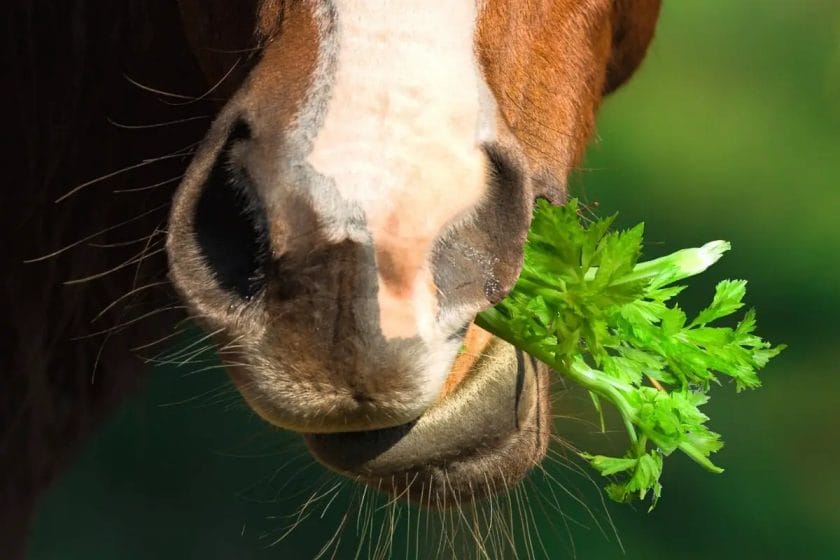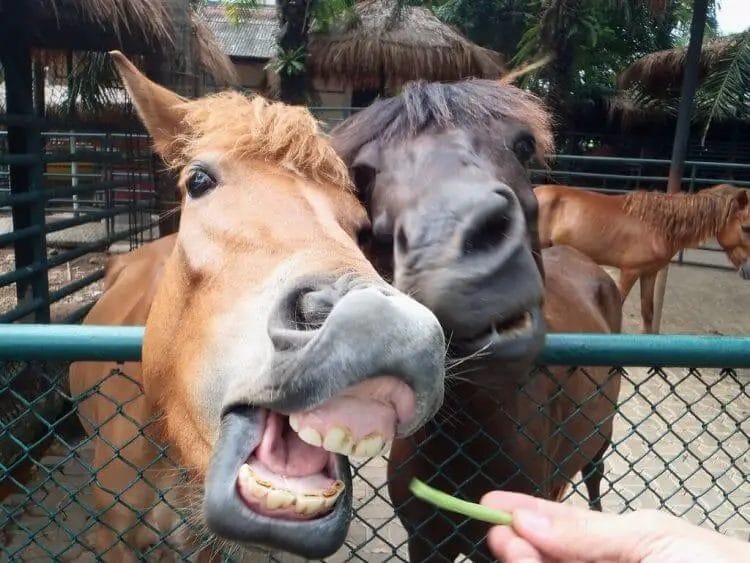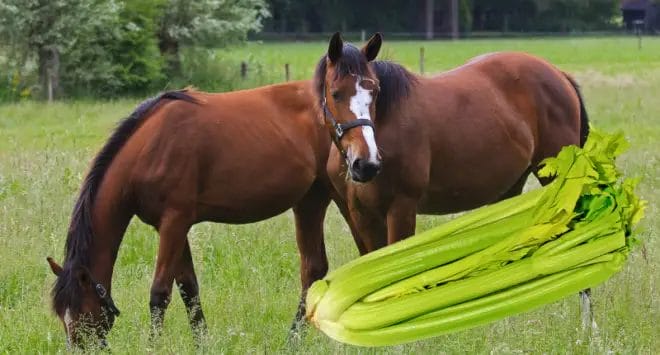Do horses like celery? This is a common question among horse owners and enthusiasts. While horses are primarily herbivores and eat a variety of plants, including grasses, hay, and certain fruits and vegetables, their preference for celery can vary. Some horses enjoy the crunchiness and high fiber content of celery, while others may not be as fond of its taste. It is important to introduce any new food, including celery, gradually to a horse’s diet and monitor their reaction for any signs of digestive upset or allergies.

Incorporating Celery into a Horse’s Diet
Celery is a versatile and nutritious vegetable that can be enjoyed by humans, but did you know that it can also be beneficial for horses? Adding celery to a horse’s diet can provide various health benefits and serve as a tasty treat. In this section, we will explore how you can incorporate celery into your horse’s diet and the advantages it can offer.
1. Introducing Celery Gradually
When introducing any new food to a horse’s diet, it’s important to do so gradually to avoid any digestive upset. The same goes for celery. Start by offering small amounts of celery alongside their regular feed and monitor their reaction. Gradually increase the quantity over time as your horse becomes accustomed to it.
2. Preparing Celery for Horses
Before including celery in your horse’s diet, it’s crucial to prepare it properly. Wash the celery thoroughly to remove any dirt or pesticide residues. Next, trim off the leaves and cut the celery stalks into bite-sized pieces. This will make it easier for your horse to chew and digest.
3. Benefits of Celery for Horses
Celery is a low-calorie vegetable that contains essential vitamins and minerals, making it a healthy addition to a horse’s diet. Some of the benefits of incorporating celery into your horse’s diet include:
- Hydration: Celery has a high water content, which can help keep your horse hydrated, especially during hot weather or strenuous activities.
- Digestive Health: The fiber present in celery can aid in digestion and help prevent digestive issues such as colic or constipation.
- Joint Health: Celery contains natural anti-inflammatory properties, which can be beneficial for horses with joint stiffness or arthritis.
- Weight Management: As a low-calorie snack, celery can be a healthy option for horses that need to manage their weight or are on a restricted diet.
- Oral Health: Chewing on celery stalks can help promote good dental health in horses by naturally wearing down their teeth.
4. Moderation is Key
While celery can offer numerous benefits, it’s essential to remember that moderation is key. Celery should be given as a supplemental treat and not as a replacement for a balanced horse feed. It’s important to maintain a well-rounded diet that includes hay, grains, and other essential nutrients.
5. Considerations and Precautions
Before incorporating celery into your horse’s diet, there are a few considerations and precautions to keep in mind:
- Allergy or Sensitivity: Some horses may have an allergic reaction or sensitivity to celery. Monitor your horse closely for any adverse reactions such as diarrhea, colic, or skin irritations.
- Oxalates: Celery contains oxalates, which in large quantities, can interfere with calcium absorption. If your horse has a history of calcium-related health issues, it’s best to consult with a veterinarian before adding celery to their diet.
- Quality and Freshness: Make sure to choose fresh, crisp celery for your horse. Avoid wilted or spoiled stalks, as they may not be safe for consumption.
In Summary
Celery can be a nutritious and enjoyable addition to your horse’s diet. By introducing it gradually, preparing it properly, and considering the benefits and precautions, you can incorporate celery into your horse’s routine safely. Remember to use celery as a treat and maintain a balanced diet to ensure your horse’s overall wellbeing.

Ways to Introduce Celery to Horses
Introducing new foods to horses can sometimes be a tricky task, especially when it comes to vegetables. Celery, which is highly nutritious and packed with vitamins, can be a beneficial addition to a horse’s diet. However, horses can be picky eaters and may be hesitant to try something new. In this section, we will explore some effective ways to introduce celery to horses and ensure they enjoy this healthy treat.
1. Start with Small Quantities
When introducing celery to a horse, it is important to start with small portions. Begin by offering a small piece of celery and observe how the horse reacts. If the horse shows interest and eats it willingly, gradually increase the portion size over time. This gradual introduction allows the horse to get accustomed to the taste and texture of celery without overwhelming their digestive system.
2. Mix with Other Foods
Another effective way to introduce celery to horses is by mixing it with other foods they already enjoy. Chopping up celery into small pieces and mixing it with their regular feed or treats can make it more enticing. The familiar taste of their favorite foods combined with the new addition of celery can help horses develop a liking for this healthy treat.
3. Offer as a Reward
Horses respond well to positive reinforcement, so using celery as a reward during training sessions can be an excellent way to introduce it to them. When the horse successfully completes a task or shows good behavior, offer them a small piece of celery as a treat. This not only helps them associate celery with positive experiences but also encourages them to try it willingly.
4. Try Different Preparations
Celery can be served in various ways to add variety and appeal to a horse’s palate. Some horses may prefer whole celery stalks, while others may prefer smaller, chopped pieces. Additionally, you can try steaming or blanching celery to soften its texture and make it easier to chew. Experimenting with different preparations can help you find the one that your horse enjoys the most.
5. Gradually Increase Frequency
Once your horse shows a positive response to celery and starts eating it regularly, you can gradually increase the frequency of offering it. However, it is essential to keep track of how much celery your horse consumes to ensure it does not become excessive. Remember that moderation is key when introducing any new food to a horse’s diet.
6. Consult with a Veterinarian
If you have any concerns or questions about introducing celery to your horse, it is always advisable to consult with a veterinarian. They can provide personalized guidance based on your horse’s specific dietary needs and overall health. A veterinarian can also help you determine the appropriate quantity of celery to include in your horse’s diet.
In summary, introducing celery to horses can be done successfully by starting with small quantities, mixing it with other foods, offering it as a reward, trying different preparations, gradually increasing the frequency, and consulting with a veterinarian if needed. By following these tips, you can ensure your horse enjoys the nutritional benefits of celery while maintaining a balanced and varied diet.

Celery as a Treat for Horses
Celery is not only a popular snack for humans, but it can also make a delicious and healthy treat for horses. Horses enjoy the crisp texture and refreshing taste of celery, and it can be a great way to reward them during training or as an occasional treat. However, it is important to feed celery to horses in moderation and ensure that it is prepared and offered safely to prevent any potential health issues.
Benefits of Feeding Celery to Horses
Feeding celery to horses can provide several benefits. Firstly, celery is low in calories, making it a healthy option for horses who need to watch their weight or are on a restricted diet. It can be a great substitute for high-calorie treats that may contribute to weight gain or health issues such as obesity or metabolic disorders.
Secondly, celery is rich in fiber, which can aid in digestion and promote a healthy gut. It can help prevent digestive problems such as colic or impaction, and keep the digestive system functioning properly.
Additionally, celery contains vitamins and minerals that are beneficial for horses. It is a good source of vitamin C, which is an antioxidant that supports the immune system and helps prevent oxidative stress. It also provides vitamins A and K, as well as minerals like potassium and calcium.
Preparing Celery for Horses
Before offering celery to your horse, it is important to prepare it properly. Start by washing the celery thoroughly to remove any dirt or pesticide residue. Cut off the leafy green tops and any tough or fibrous parts of the stalk, as these may be difficult for the horse to chew and digest.
Next, cut the celery into small, bite-sized pieces that are easy for the horse to consume. This will help prevent choking or any other gastrointestinal issues. It is also recommended to remove the strings that run along the length of the celery stalk, as these can be tough and difficult for horses to chew.
Offering Celery to Horses
When offering celery to your horse, it is important to do so in moderation. While celery is generally safe for horses, excessive consumption can lead to digestive upset or an imbalance in the horse’s diet.
Start by introducing small amounts of celery as a treat and monitor your horse’s reaction. Some horses may have an aversion to the taste or texture of celery, so it is important to offer it gradually and observe their response. If the horse enjoys celery and shows no adverse effects, you can continue to offer it as a treat.
It is also important to remember that celery should never replace a horse’s regular diet. Celery should only be offered as an occasional treat or reward, in addition to a balanced and nutritious diet consisting of hay, grains, and other appropriate horse feeds.
In summary, celery can be a healthy and enjoyable treat for horses when offered in moderation. It provides various benefits such as low-calorie content, fiber for digestion, and essential vitamins and minerals. By preparing celery properly and monitoring the horse’s response, it can be a safe and delicious addition to your horse’s treat repertoire.
Precautions and Considerations when Feeding Celery to Horses
While celery can be a healthy snack for humans, it’s important to exercise caution when feeding it to horses. Horses have different dietary requirements and digestive systems than humans, so certain precautions and considerations should be taken into account to ensure the health and well-being of the horse.
1. Quantity
When feeding celery to horses, it’s important to limit the quantity. Celery should be considered a treat or supplement, rather than a significant part of the horse’s diet. Feeding large amounts of celery can lead to digestive upset and potentially cause colic, which is a serious and potentially life-threatening condition.
It’s recommended to only feed small pieces of celery occasionally as a treat. This will help prevent any digestive issues and ensure a balanced diet for the horse.
2. Preparation
Prior to feeding celery to a horse, it’s crucial to wash and prepare it properly. Celery should be thoroughly rinsed to remove any dirt, pesticides, or other contaminants that may be present on the surface.
It’s also essential to cut the celery into small, bite-sized pieces. This will make it easier for the horse to chew and digest, reducing the risk of choking or impaction in the intestinal tract.
3. Introduce Gradually
If you’re introducing celery to a horse’s diet for the first time, it’s important to do so gradually. Abrupt changes in diet can lead to digestive upset and colic. Begin by offering small amounts of celery as a treat and gradually increase the quantity over time.
Observing the horse’s reaction to the celery is crucial. If any signs of discomfort, such as diarrhea or changes in appetite, occur, it’s essential to discontinue feeding celery and consult a veterinarian.
4. Allergies and Sensitivities
Just like humans, horses can have allergies or sensitivities to certain foods. While celery is generally considered safe for horses, it’s still possible for individual horses to have adverse reactions.
If you notice any signs of an allergic reaction, such as hives, swelling, or difficulty breathing, it’s important to stop feeding celery immediately and seek veterinary attention.
5. Nutritional Considerations
While celery can offer some nutritional benefits, it’s important to understand its limitations. Celery is primarily made up of water and contains minimal fat, protein, and carbohydrates. Therefore, it should not be relied upon as a significant source of nutrients for horses.
A balanced diet for horses should consist mainly of high-quality forage, such as hay or pasture, along with appropriate amounts of grains and supplements if necessary. Celery should only be offered as an occasional treat or supplement to the horse’s diet.
Summary
Celery can be fed to horses in moderation as a treat, but certain precautions and considerations must be taken. Limiting the quantity, properly preparing the celery, introducing it gradually, being aware of allergies or sensitivities, and acknowledging its limited nutritional value are all important factors to keep in mind when feeding celery to horses. By following these precautions, you can ensure the health and well-being of your horses.
FAQs
Do horses like celery?
Yes, some horses enjoy eating celery. It can be a healthy and low-calorie treat for them. However, not all horses may have a taste for it, so it’s best to introduce it gradually and in moderation.
Conclusion
In conclusion, while horses are herbivores and can eat a wide variety of plants, including celery, it is important to note that their preferences and digestive systems may vary. Some horses may enjoy the taste of celery as a treat, while others may not show a particular interest. As with any new food introduction, it is essential to monitor your horse’s reaction and intake to ensure their well-being. Remember to consult with a veterinarian or equine nutritionist for proper dietary recommendations tailored to your horse’s specific needs. Ultimately, providing a balanced and appropriate diet is crucial for maintaining your horse’s health and happiness.
